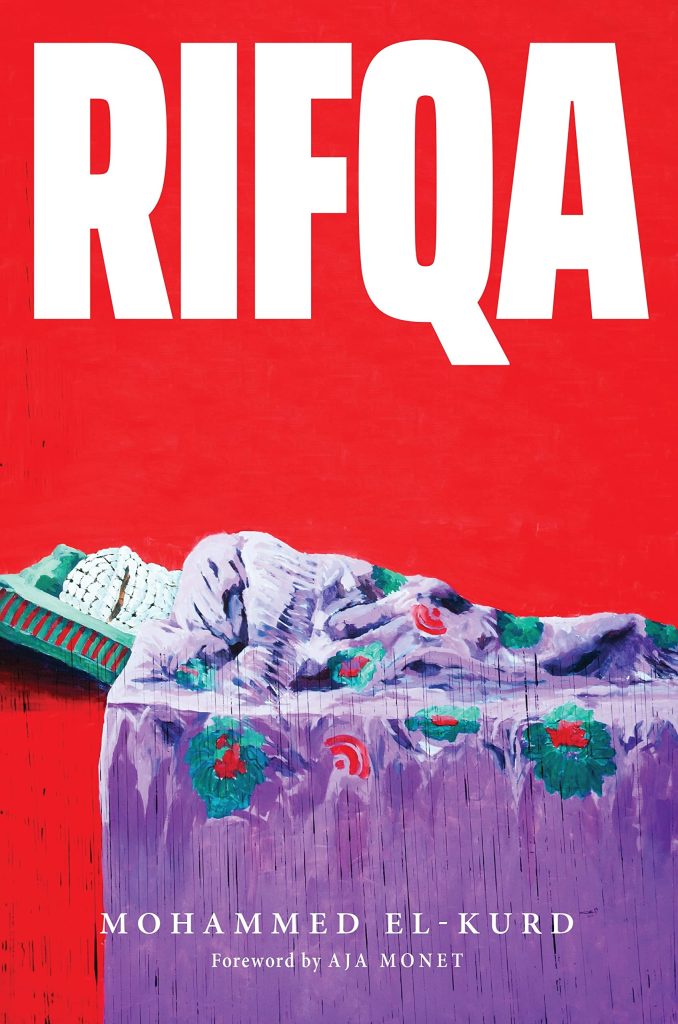Rifqa (SHORTLISTED, 2022 FORWARD POETRY PRIZES FOR BEST FIRST COLLECTION)
Mohamed El-Kurd
(Haymarket Books, 2021); pbk $16.00
Rifqa is Mohammed El-Kurd’s first poetry collection. The Palestinian poet currently lives in the USA, where he is studying for an MFA in Poetry at Brooklyn College. His work has appeared in The Guardian, The New York Times and The Washington Post, among other news publications.
In this collection, the poet celebrates the life of his grandmother, the eponymous Rifqa, whom El-Kurd describes as ‘older than Israel’ and through his poetry, shows how Rifqa inspired him to bring the World’s attention to the plight of the Palestinian people. It is a challenging read, a lucid and angry voice against an unjust situation to which there seems no hope of resolution.
The collection is split into four main sections, with a separate final poem, ‘Farewell, Palestine’s Jasmine’, and bookended by a Foreword by aja monet and an Afterword, titled, ‘Lest there be Unclarity’.
aja monet was part of a delegation Black American activists who visited Rifqa and Mohammed’s home in Sheikh Jarrah, an area within Jerusalem, after learning about the family while watching a film documentary. Her Foreword is a call to action for the recognition of the injustices and violence towards the Palestinian people through the colonisation of their land by Israel.
The first three poems in Section One set the scene. Jerusalem, along with most of the land of Palestine was annexed on 15 May 1948 by the creation of the Israeli state. Hundreds of thousands of Palestinian people were displaced during the period they call the ‘Nakba’, meaning ‘catastrophe’,
which many Palestinians feel is the name of an ongoing regime of repression, destruction and apartheid conducted against them.
In ‘Born on Nakba Day’, El-Kurd describes, how protesters demonstrated against the Israeli occupation of Palestine outside the hospital where his mother was giving birth to his twin sister and he.
The final, long poem of Section One is titled, ‘Rifqa’, and it tells the story of the day the newly-formed Israeli state invaded and drove people out of their homes, their towns and into refugee camps. Rifqa was evicted from her home town of Haifa and moved to Jerusalem, always with the belief that she would return home one day. Seven decades later, through many major battles, the family is still in exile in Jerusalem. The poet writes:
1956
Lucky refugees given houses
Lucky wrapped in the shiny promises of
UNRWA the Jordanian government grandma
A lucky refugee grew vines of roses around the house;
This time the roses had thorns
Just in case.
Rifqa uses a disjointed style effectively, to indicate the disruption and damage to people’s physical lives, but also to their emotional reactions to the atrocities visited on them. He continues,
1967 another Nakba
another man-made catastrophe
names of places dispossessed
names on tombstones rewritten
Sheikh Jarrah became Shimon Ha’tsiddik
Jerusalem
Bride of the fantasy
Once more.
Section Two of the collection deals with patriarchal and colonialist violence in other parts of the world, showing the connection between the treatment of women of colour by men in power globally. The poem, ‘Three women’, tells the stories of women giving birth in extremely violent and dangerous scenarios, in the presence of military personnel or on bomb sites. The imagery is harrowing, but it demands to be witnessed.
The third section of the collection was written while the poet was studying in Atlanta, in the USA. In it, he dedicates poems to Malcolm X, quotes B.B. King and uses work by other Black American authors such as the feminist activist, Audre Lorde as inspiration for his own work.
The fourth section returns to Jerusalem. Here the poetry becomes more prose-like, with more straightforwardly graphic descriptions of individual acts of inhumanity towards protesters. In the final tribute to Rifqa, he describes his grandmother, now in her eighties, tending to tear-gassed youngsters. For El-Kurd, Rifqa has become an eternal symbol of resistance.
Jenny Gorrod


Leave a Reply